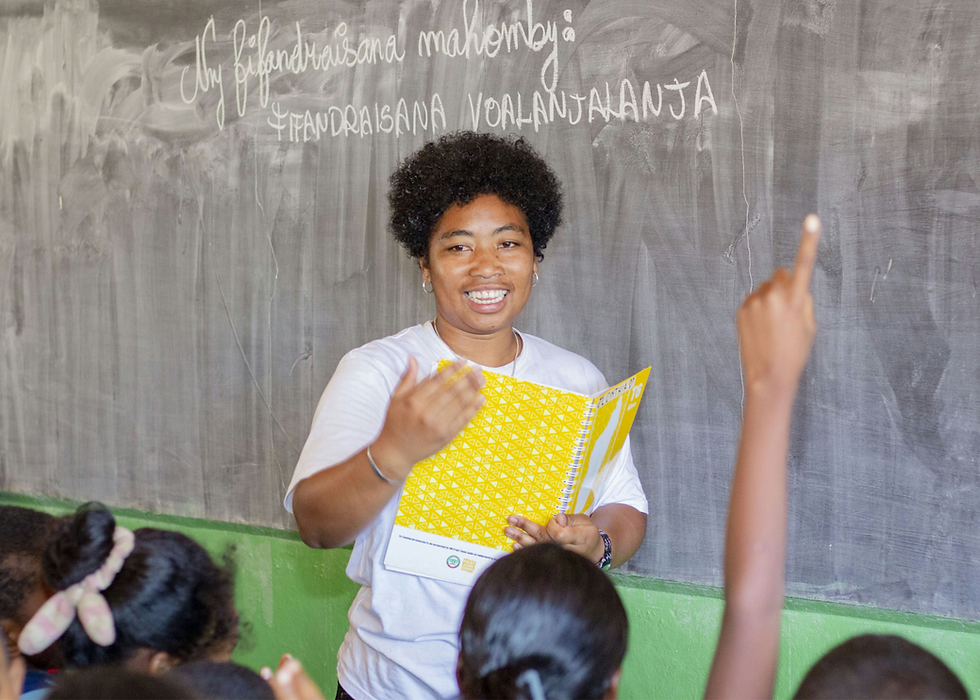Improving accountability to our students, one bean at a time
- Laura Leeson

- Sep 12, 2019
- 3 min read
Updated: Oct 23, 2021
A common shortcoming of comprehensive sexuality education programs is their failure to listen to the voices of youth they are meant to serve.
This is true in Madagascar, where top-down approaches to school-based sexuality education have lacked meaningful youth engagement during planning or implementation.
As part of the Resilient Roots Initiative with CIVICUS and through collaboration with AmplifyChange, Projet Jeune Leader has worked to change this standard by creating an improved and systematic feedback system to hear the voices of young Malagasy students.
It's through this system that we can improve our accountability to these primary constituents (youth are who we are trying to serve, after all!) and make continuous, learning-based modifications to our programming.
The result is a new rapid rural appraisal technique through "bean-voting" that enables students to share their thoughts, opinions, and experiences.
Now, in systematic and regular intervals, students in our courses give their feedback on different indicators by "voting" with beans.
With this, we have been able to look at different dimensions of our accountability, such as students' trust in their PJL educator, students' opinions on the quality of PJL courses, and if students feel PJL is relevant to their lived experiences.
The most important part is that we ensure students know how we are using their feedback to improve, so that they know their voices are heard and valued by PJL.
WHAT IT LOOKS LIKE
Supervising staff who already conduct regular in-person evaluations at schools lead the activity after a course has finished. PJL Educators leave the classroom, allowing students to answer anonymously.
The supervisor provides each student with a bean and reads a question. Then, all students cast their "vote" into a bucket corresponding to their answer on a three-point scale. To help mitigate against social desirability, students cast their bean in a make-shift, confidential voting booth. The enthusiasm (and smiles!) from the students during the activity are the best part of the process.

HOW IT IMPROVES PROGRAMMING
Supervising staff triangulate results from the feedback mechanism, alongside their own observations and rubric evaluations of the course, to provide immediate suggestions for improvement to Educators.
Straight away, Educators learn to make concrete and specific course corrections on their teaching techniques, classroom management, and use of participatory and interactive activities.
HOW IT INCREASES ACCOUNTABILITY
During the following week's course, PJL Educators report back to their students about what they learned and what changes they are making as a result of the students' feedback.
It's this "closing of the feedback loop" that helps students know that their opinions are valued by PJL.
An unexpected result we saw from this process was that Educators, themselves, felt that PJL was also becoming more accountable to them through the mechanism originally meant for students.
During the final iterations and evaluation of the feedback mechanism we were surprised to learn that Educators highly valued the bean-voting system. They felt that having students' opinions on-hand better grounded the constructive feedback supervisors were already giving during in-person course evaluations. They said it helped opened a dialogue between them and their supervisors during the feedback exchange, instead of being a one-sided discussion.
Importantly, our Educators also felt more validated and motivated when she saw that students gave them positive feedback.
Beans have become an important line item in our operating budget, as this accountability feedback mechanism is now integrated into our organization's monitoring activities. By earnestly seeking and incorporating students' feedback, we are ensuring we remain learner- and youth-centered in our work in Madagascar's middle schools, and remaining accountable to the exact group it's our purpose to serve.


IMPROVING OUR PERFORMANCE. Students' responses to the "bean-voting" feedback mechanism helped to identify certain schools that need targeted help. By triangulating "bean data" with in-person evaluations done by Supervising staff and reporting done by Educators, specific and concrete feedback can be given to help improve Educators' work and students' experiences with PJL.

BOOSTING MOTIVATION. Our main claims to fame as a program are that we are filling a critical gap in the education system and services that exist for adolescents in Madagascar, and that our dynamic Educators are best placed to do what they do because of their training and inherent qualities we recruit them for.
The results from these 'bean-voting' questions were a huge moral and motivation boost for our Educators and staff, validating that their work is truly important. These are also the kind of data points that can either stand alone, or that we can triangulate with stories of change, to demonstrate to all of our stakeholders – local, national, and international - about why our program is important and should continue to exist and grow.



